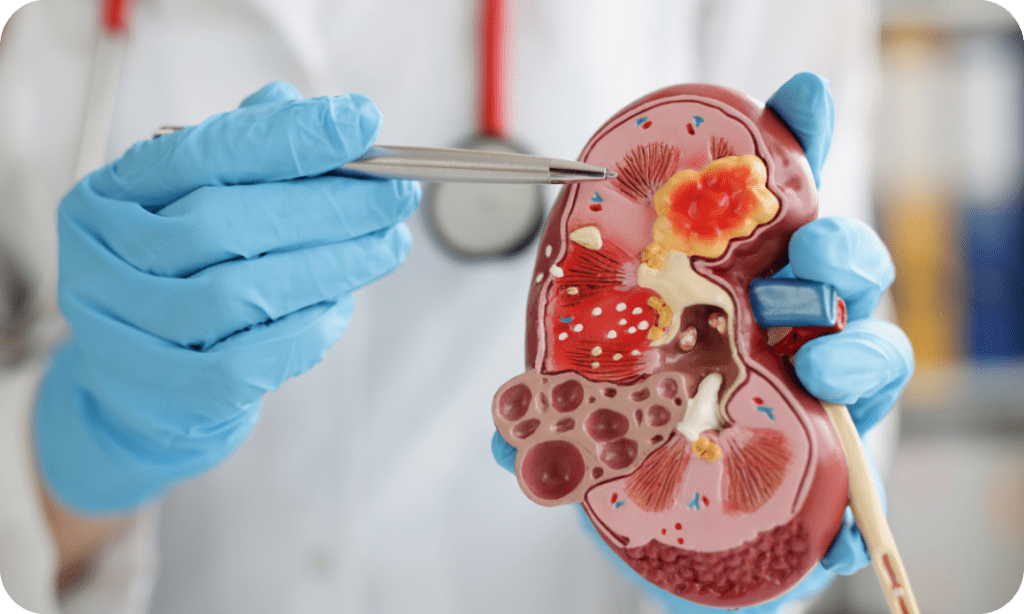Kidney cancer, also known as renal cancer, occurs when malignant cells grow uncontrollably in the tissues of the kidneys. The kidneys, two bean-shaped organs located on either side of the spine, play a crucial role in filtering blood and removing waste through urine. The most common type of kidney cancer is renal cell carcinoma (RCC), which accounts for about 90% of cases. Kidney cancer is typically detected early, but in advanced stages, it can spread to other parts of the body.

Kidney Cancer
Detailed Information
The exact cause of kidney cancer is unknown, but several risk factors may contribute to its development:
1. Smoking: Smoking increases the risk of kidney cancer, as harmful substances in tobacco can affect kidney function.
2. Obesity: Being overweight is associated with changes in certain hormones that can increase cancer risk.
3. High Blood Pressure: Hypertension can damage the kidneys over time, leading to an increased risk of cancer.
4. Family History: A family history of kidney cancer may raise your chances of developing the disease.
5. Genetic Factors: Some inherited syndromes, such as von Hippel-Lindau disease, are linked to kidney cancer.
6. Exposure to Toxins: Long-term exposure to toxic chemicals like asbestos, cadmium, or certain solvents can increase the risk.
1. Smoking: Smoking increases the risk of kidney cancer, as harmful substances in tobacco can affect kidney function.
2. Obesity: Being overweight is associated with changes in certain hormones that can increase cancer risk.
3. High Blood Pressure: Hypertension can damage the kidneys over time, leading to an increased risk of cancer.
4. Family History: A family history of kidney cancer may raise your chances of developing the disease.
5. Genetic Factors: Some inherited syndromes, such as von Hippel-Lindau disease, are linked to kidney cancer.
6. Exposure to Toxins: Long-term exposure to toxic chemicals like asbestos, cadmium, or certain solvents can increase the risk.
In its early stages, kidney cancer may not cause noticeable symptoms. However, as the cancer grows, the following symptoms may appear:
• Blood in the urine (hematuria), which may cause the urine to look pink, red, or brown.
• Persistent pain in the lower back or side, typically on one side.
• Unexplained weight loss.
• Fatigue and weakness.
• Fever that comes and goes.
• Swelling in the ankles or legs.
• Blood in the urine (hematuria), which may cause the urine to look pink, red, or brown.
• Persistent pain in the lower back or side, typically on one side.
• Unexplained weight loss.
• Fatigue and weakness.
• Fever that comes and goes.
• Swelling in the ankles or legs.
While there is no guaranteed way to prevent kidney cancer, the following steps can help reduce the risk:
1. Quit Smoking: Avoiding tobacco use significantly lowers the risk of kidney cancer.
2. Maintain a Healthy Weight: A balanced diet and regular exercise can help prevent obesity, a risk factor for kidney cancer.
3. Control Blood Pressure: Regularly monitor and manage high blood pressure with lifestyle changes or medications.
4. Stay Hydrated: Drinking plenty of water helps the kidneys function properly and may reduce cancer risk.
5. Avoid Exposure to Harmful Chemicals: If you work in industries that involve toxins, follow safety protocols to limit exposure.
1. Quit Smoking: Avoiding tobacco use significantly lowers the risk of kidney cancer.
2. Maintain a Healthy Weight: A balanced diet and regular exercise can help prevent obesity, a risk factor for kidney cancer.
3. Control Blood Pressure: Regularly monitor and manage high blood pressure with lifestyle changes or medications.
4. Stay Hydrated: Drinking plenty of water helps the kidneys function properly and may reduce cancer risk.
5. Avoid Exposure to Harmful Chemicals: If you work in industries that involve toxins, follow safety protocols to limit exposure.
Treatment for kidney cancer depends on the stage and type of cancer, as well as the patient’s overall health. Common treatment options include:
1. Surgery: The most common treatment is nephrectomy, where part or all of the kidney is removed to eliminate the cancerous tissue.
2. Ablation Therapy: For small tumors, ablation uses extreme heat or cold to destroy cancer cells without surgery.
3. Targeted Therapy: Drugs that specifically target cancer cells’ growth pathways, often used in advanced kidney cancer.
4. Immunotherapy: Medications that stimulate the immune system to attack cancer cells.
5. Radiation Therapy: Radiation is rarely used for kidney cancer but may be an option in certain advanced cases or if surgery is not possible.
1. Surgery: The most common treatment is nephrectomy, where part or all of the kidney is removed to eliminate the cancerous tissue.
2. Ablation Therapy: For small tumors, ablation uses extreme heat or cold to destroy cancer cells without surgery.
3. Targeted Therapy: Drugs that specifically target cancer cells’ growth pathways, often used in advanced kidney cancer.
4. Immunotherapy: Medications that stimulate the immune system to attack cancer cells.
5. Radiation Therapy: Radiation is rarely used for kidney cancer but may be an option in certain advanced cases or if surgery is not possible.
Book Your Consultation Now
Schedule an appointment with the leading uro-oncologist in Bangalore, Dr. Anil
Kumar T. Benefit from expert care and advanced treatment options for all your
urological needs, delivered with a patient-centered approach.

Resolve Your Queries
Answers to the most common inquiries about urological conditions, treatments, and patient care. Designed to offer quick guidance and help you better understand, ensuring you feel informed and confident in your healthcare decisions.
Still have queries about Urology & Uro Oncology? Hit the button below.
Accordion Tab Title 2
Lorem ipsum dolor sit amet, consectetur adipisicing elit. Optio, neque qui velit. Magni dolorum quidem ipsam eligendi, totam, facilis laudantium cum accusamus ullam voluptatibus commodi numquam, error, est. Ea, consequatur.
Accordion Tab Title 3
Lorem ipsum dolor sit amet, consectetur adipisicing elit. Optio, neque qui velit. Magni dolorum quidem ipsam eligendi, totam, facilis laudantium cum accusamus ullam voluptatibus commodi numquam, error, est. Ea, consequatur.
Visit Us
Zymus Hospital Address
No.1, K NO. 92, Nanjappa Complex, Kanakapura Rd, Raghuvanahalli, Bangalore City Municipal Corporation Layout, Bengaluru, Karnataka 560062
Menu
Menu
Quick Links
Menu
Copyright © 2024. Dr Anil Kumar T

